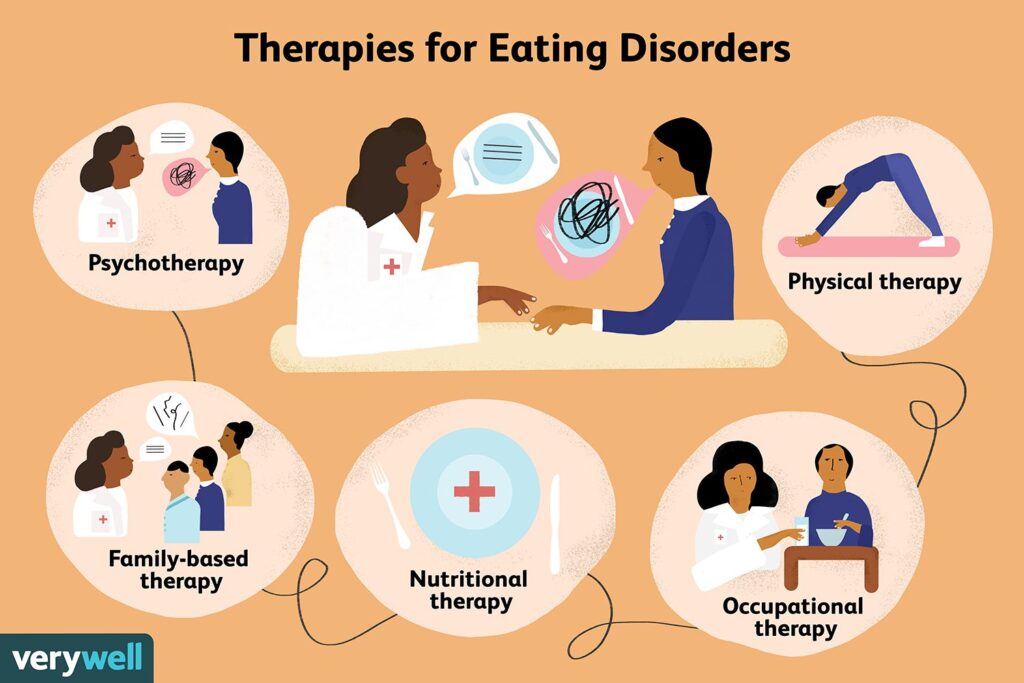Understanding Eating Disorders: Types, Causes, and Treatment
Eating disorders are a range of mental illnesses that lead to the formation of unhealthy eating habits. This disorder can begin with people becoming obsessed with food, weight, or body image. In severe cases, eating disorders can have a serious impact on people’s health and may even lead to death if left untreated. Typically, people with eating disorders experience a variety of symptoms. Common symptoms include severe food restriction, binge eating, and purging behaviors such as vomiting or excessive exercise.
Causes of Eating Disorders
According to experts, there are many factors that have been found to cause eating disorders.
- Genetics: People who have a sibling or parent with an eating disorder in their family seem to have a somewhat increased risk of developing an eating disorder than normal people.
- Individual’s personality traits: According to the results of a 2015 study, experts found that people with three personality traits – neuroticism, perfectionism and impulsivity – tend to have a higher risk of having an eating disorder.
- Other potential causes for eating disorder include the pressure people feel to be thin, the preference for a thin body culture in a society and the goal that some people have in trying to get as close as possible to those with perfect bodies that are presented in social media.

Different Types of Eating Disorders
In nowadays society, two widely recognized eating disorder symptoms include Anorexia Nervosa and Bulimia Nervosa. Both disorders can have varying degrees of impact on people’s physical and mental health
Anorexia Nervosa
This type of eating disorder is probably one of the most widely recognized eating disorders in society. Over the course of a person’s life, anorexia nervosa typically develops during adolescence or young adulthood and tends to affect more females than males. Patients affected by this disorder usually consider themselves to be overweight, although many times they are actually severely underweight. Such patients will often constantly check their weight, avoid foods that they believe will increase their weight, and severely restrict calorie intake.

Bulimia Nervosa
Bulimia Nervosa is another well-known eating disorder. Very similar to anorexia, bulimia also tends to develop in adolescence and early adulthood, and it seems to be less common in males than females. The main symptom that patients with bulimia manifest is eating abnormally large amounts of food at a given time. Sufferers continue each binge until they are painfully full, and during the binge they usually feel unable to stop eating or control the amount of food they eat. Although these bulimics may attempt to purge after each binge to compensate for the calories consumed and to relieve intestinal discomfort, typically they purge in a manner that is similarly very unkind to their bodies. Common purging behaviors include forced vomiting, fasting, taking laxatives, diuretics, enemas, and excessive exercise.

Possible Treatments
Since in many cases, the physical and psychological conditions of people suffering from different eating disorders are different, the treatment plans used to deal with eating disorders are customized to each individual.
Possible treatment options for eating disorders include:
- Individual, group or family psychotherapy: Many specialists may recommend a type of psychotherapy called cognitive behavioral therapy (CBT) for people with eating disorders. This therapy involves learning how to recognize and change distorted or unhelpful thought patterns, thereby helping those suffering to gradually reduce binge eating.
- Medication: Many doctors may recommend that patients be treated with mood stabilizer medications, such as antidepressants, to help promptly treat other disorders, such as depression or anxiety, that they may have co-occurring as a result of their eating disorder.
- Nutritional counseling: This treatment involves working with a dietitian to learn about proper nutrition and eating habits so that it can help correct the eating habits of people with eating disorders in a timely and consistent manner, thus helping them to reduce the chances of binge eating.

Source
- Rd, A. P. M. (2022, May 18). 6 Common types of eating disorders (and their symptoms). Healthline. https://www.healthline.com/nutrition/common-eating-disorders#treatment

